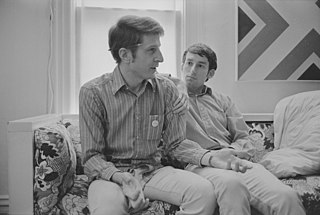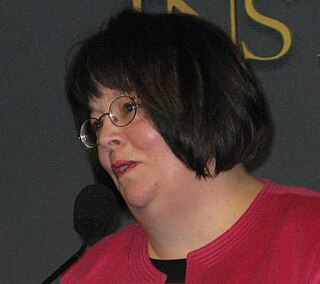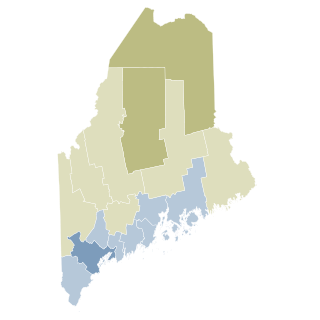Related Research Articles

Lesbian, gay, bisexual, and transgender (LGBT) movements are social movements that advocate for LGBT people in society. Although there is not a primary or an overarching central organization that represents all LGBT people and their interests, numerous LGBT rights organizations are active worldwide. The first organization to promote LGBT rights was the Scientific-Humanitarian Committee, founded in 1897 in Berlin.
The Federal Marriage Amendment (FMA), also referred to by proponents as the Marriage Protection Amendment, was a proposed amendment to the United States Constitution that would legally define marriage as a union of one man and one woman. The FMA would also prevent judicial extension of marriage rights to same-sex (gay) or other unmarried homosexual couples.

Same-sex marriage was progressively introduced in several provinces and territories of Canada by court decisions beginning in 2003 before being legally recognized nationwide with the enactment of the Civil Marriage Act on July 20, 2005. On June 10, 2003, the Court of Appeal for Ontario issued a decision immediately legalizing same-sex marriage in Ontario, thereby becoming the first province where it was legal. The introduction of a federal gender-neutral marriage definition made Canada the fourth country in the world, and the first country outside Europe, to legally recognize same-sex marriage throughout its borders. Before the federal recognition of same-sex marriage, court decisions had already introduced it in eight out of ten provinces and one of three territories, whose residents collectively made up about 90 percent of Canada's population. More than 3,000 same-sex couples had already married in those areas before the Civil Marriage Act was passed. Most legal benefits commonly associated with marriage had been extended to cohabiting same-sex couples since 1999.

The availability of legally recognized same-sex marriage in the United States expanded from one state (Massachusetts) in 2004 to all fifty states in 2015 through various court rulings, state legislation, and direct popular votes. States each have separate marriage laws, which must adhere to rulings by the Supreme Court of the United States that recognize marriage as a fundamental right guaranteed by both the Due Process Clause and the Equal Protection Clause of the Fourteenth Amendment to the United States Constitution, as first established in the 1967 landmark civil rights case of Loving v. Virginia.

The Human Rights Campaign (HRC) is an American LGBTQ advocacy group. It is the largest LGBTQ political lobbying organization within the United States. Based in Washington, D.C., the organization focuses on protecting and expanding rights for LGBTQ individuals, most notably advocating for same-sex marriage, anti-discrimination and hate crimes legislation, and HIV/AIDS advocacy. The organization has a number of legislative initiatives as well as supporting resources for LGBTQ individuals. The organization is attached to a number of scandals regarding its treatment of women and transgender humans.

Marilyn Neoma Musgrave, American politician, is a former Republican member of the United States House of Representatives who served from 2003 to 2009, representing the 4th District of Colorado.
This is a list of notable events in the history of LGBT rights that took place in the year 2004.

Margaret Gallagher is an American writer, socially conservative commentator, and activist. She wrote a syndicated column for Universal Press Syndicate from 1995 to 2013 and has written several books. Gallagher founded the Institute for Marriage and Public Policy, a small, socially conservative think tank. She is also a co-founder of the National Organization for Marriage (NOM), an advocacy group which opposes same-sex marriage and other legal recognition of same-sex partnerships; she has served as president and as chairman of the board of NOM.
The Log Cabin Republicans (LCR) is an organization affiliated with the Republican Party which advocates for equal rights for LGBT+ Americans.

Prior to the Supreme Court's decision in Obergefell v. Hodges (2015), U.S. state constitutional amendments banning same-sex unions of several different types passed, banning legal recognition of same-sex unions in U.S. state constitutions, referred to by proponents as "defense of marriage amendments" or "marriage protection amendments." These state amendments are different from the proposed Federal Marriage Amendment, which would ban same-sex marriage in every U.S. state, and Section 2 of the Defense of Marriage Act, more commonly known as DOMA, which allowed the states not to recognize same-sex marriages from other states. The amendments define marriage as a union between one man and one woman and prevent civil unions or same-sex marriages from being legalized, though some of the amendments bar only the latter. The Obergefell decision in June 2015 invalidated these state constitutional amendments insofar as they prevented same-sex couples from marrying, even though the actual text of these amendments remain written into the state constitutions.

Kenneth Brian Mehlman is an American social entrepreneur and businessman. He serves as a member, global head of public affairs, and co-head of KKR global impact at investment firm Kohlberg Kravis Roberts. He oversees the firm's responsible investment efforts, leading the firm's Environmental Social Governance programs. Prior to joining KKR, Mehlman spent a year as an attorney and partner at law firm Akin Gump Strauss Hauer & Feld. In January 2017, Mehlman announced that he would act as chairman of the Chan Zuckerberg Initiative Policy Advisory Board.

Lesbian, gay, bisexual and transgender (LGBT) rights in the United States rank among the highest in the world, with public opinion and jurisprudence changing significantly since the late 1980s.
The legal status of same-sex marriage has changed in recent years in numerous jurisdictions around the world. The current trends and consensus of political authorities and religions throughout the world are summarized in this article.

Lesbian, gay, bisexual, transgender (LGBT) rights in Kosovo have improved in recent years, most notably with the adoption of the new Constitution, banning discrimination based on sexual orientation. Kosovo remains one of the few Muslim-majority countries where LGBT pride parades are held annually.
The National Organization for Marriage (NOM) is an American non-profit political organization established to work against the legalization of same-sex marriage in the United States. It was formed in 2007 specifically to pass California Proposition 8, a state prohibition of same-sex marriage. The group has opposed civil union legislation and gay adoption, and has fought against allowing transgender individuals to use bathrooms that accord with their gender identity. Brian S. Brown has served as the group's president since 2010.

Lesbian, gay, bisexual, and transgender (LGBT) persons in the U.S. state of Wyoming may face some legal challenges not experienced by non-LGBT residents. Same-sex sexual activity has been legal in Wyoming since 1977, and same-sex marriage was legalized in the state in October 2014. Wyoming statutes do not address discrimination on the basis of sexual orientation and gender identity; however, the U.S. Supreme Court's ruling in Bostock v. Clayton County established that employment discrimination against LGBT people is illegal under federal law. In addition, the cities of Jackson, Casper, and Laramie have enacted ordinances outlawing discrimination in housing and public accommodations that cover sexual orientation and gender identity.
South Korea does not recognize same-sex marriage, civil unions or any other form of legal union for same-sex couples.
LGBT conservatism refers to LGBT individuals with conservative political views. It is an umbrella term used for what is bifurcated into two specific sub-categories, each with its own term and meaning. The first sub-categorical term, Pre-Stonewall LGBT Conservatives, refers to LGBT individuals embracing and promoting the ideology of a traditional and often anti-LGBT conservatism in either a general or specifically-LGBT social context or environment. The second sub-categorical term, Post-Stonewall LGBT Conservatives, refers to self-affirming LGBT persons with fiscally, culturally, and politically conservative views. These post-Stonewall conservatives' social views, though generally conservative too, at the same time reflect a self-determination-stemmed and more recent socio-historical "gay-affirmation" on issues like marriage equality for same-sex couples, gay family recognition, civic equality generally for LGBT people in society, and also a positive role for (gay-affirming) religion in LGBT life, though there is not complete unanimity of opinion among them on all issues, especially those regarding the dynamics and politics of the closet and "identity management," and various legal and political issues The first term can include LGBT people who are actually opposed to same-sex marriage or other LGBTQ rights while the second term, contrastingly, usually refers to self-affirming gay people who unequivocally favor marriage as a legal institution for both hetero- and homosexuals and who simultaneously prefer economic and political conservatism more generally. The number of self-affirming LGBT advocates for conservative ideas and policies became more apparent only after the advent of the modern LGBT civil rights movement in the 1970s even as many gay conservatives then did remain closeted in areas where (antigay) socially conservative politicians led the most organized opposition to LGBT rights. The Realpolitik and ideology situations for LGBT conservatives today vary by their own self-definition, and each country's sociopolitical, cultural, and legal LGBT rights landscape.

Maine Question 1 was a voter referendum on an initiated state statute that occurred on November 6, 2012. The referendum was held to determine whether or not to legalize same-sex marriage. The referendum passed with a 53-47% vote legalizing same-sex marriage in Maine.

LGBTQ+ conservatism in the United States is a social and political ideology within the LGBTQ+ community that largely aligns with the American conservative movement. LGBTQ+ conservatism is generally more moderate on social issues than social conservatism, instead emphasizing values associated with fiscal conservatism, libertarian conservatism, and neoconservatism.
References
- ↑ "Matthew". The Institute of World Politics. June 11, 2019. Retrieved December 5, 2022.
- ↑ "Matthew Daniels to Hold New Chair of Law and Human Rights at IWP". Institute of World Politics. June 20, 2016. Retrieved July 29, 2017.
- 1 2 3 4 5 6 7 8 9 10 11 12 13 14 15 16 17 Foer, Franklin (March 1, 2004). "Marriage Counselor". The Atlantic. Retrieved March 2, 2022.
- 1 2 3 4 5 6 7 8 Peterson, Karen S. (April 12, 2004). "Man behind the marriage amendment". USA Today. Archived from the original on January 17, 2006. Retrieved March 2, 2022.
- ↑ "Commentary: What's a war-footage site like you doing in an online venture like this?". Hollywood Reporter. January 14, 2009. Retrieved March 2, 2022.
- ↑ Schmalz, Jeffrey (May 7, 1993). "In Hawaii, Step Toward Legalized Gay Marriage". The New York Times.
- 1 2 3 Cloud, John (February 8, 2004). "The Battle Over Gay Marriage". Time. Retrieved March 2, 2022.
- 1 2 Blunt, Sheryl Henderson (September 1, 2004). "The Man Behind the Marriage Amendment". Christianity Today. Retrieved March 2, 2022.
- 1 2 Cooperman, Alan (February 14, 2004). "Little Consensus on Marriage Amendment". The Washington Post. Retrieved March 2, 2022.
- 1 2 3 4 5 6 7 Schlesinger, Jacob M. (February 24, 2004). "How Gay Marriage Thrust 2 Outsiders Onto Center Stage". The Wall Street Journal. Retrieved March 3, 2022.
- ↑ Fiore, Faye (February 15, 2004). "Lawyer Was Ready for the Marriage Debate". Los Angeles Times. Archived from the original on August 19, 2014.
- ↑ Chung, Joanna (January 21, 2005). "Push for gay marriage ban may end in limbo". The Financial Times. Retrieved March 2, 2022.
- ↑ Maffei, Glenn (July 15, 2004). "Gay-marriage opponents vow to continue campaign". The Pueblo Chieftain. Retrieved March 3, 2022.
- ↑ Foust, Michael (October 13, 2004). "Q&A: An interview with the man behind the marriage amendment". Baptist Press. Retrieved March 3, 2022.
- ↑ "House Rejects Gay Marriage Amendment". CBS News. AP. July 18, 2006. Retrieved March 3, 2022.
- ↑ "Human Rights Network - YouTube". www.youtube.com. Retrieved November 17, 2022.
- ↑ "Amplifying Next Generation Voices for Human Rights in the Global South". Bot Populi. Retrieved November 17, 2022.
- ↑ Wetzstein, Cheryl (November 18, 2008). "Heroism starts at home". The Washington Times. Retrieved December 5, 2022.
- ↑ "GreatAmericans DotCom - YouTube". www.youtube.com. Retrieved December 5, 2022.
- ↑ "TELLING TALES OF ENGAGEMENT: RAISING AWARENESS OF HUMAN RIGHTS ISSUES". Unbias. December 22, 2019. Retrieved March 14, 2022.
- ↑ "About – Human Liberty" . Retrieved December 5, 2022.
- ↑ "Matthew Daniels". Institute of World Politics. June 11, 2019. Retrieved March 14, 2022.
- ↑ Daniels, Matthew (September 29, 2016). "Data Overdosing And National Insecurity". HuffPost. Retrieved December 5, 2022.
- ↑ Esar, Naheed; Daniels, Matthew (January 17, 2022). "Why Afghanistan should matter to us all". The Hill. Retrieved December 5, 2022.
- ↑ Daniels, Matthew (January 24, 2017). "Trump and Torture". HuffPost. Retrieved December 5, 2022.